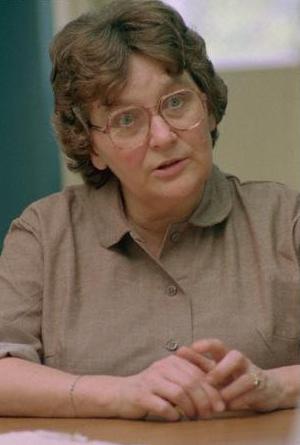Velma Barfield (Velma Barfield)

Velma Barfield was born in rural South Carolina, but grew up near Fayetteville, North Carolina. Her father reportedly was abusive and she resented her mother who did not intervene in the beatings. She escaped by marrying Thomas Burke in 1949. The couple had two children and were reportedly happy until Barfield had a hysterectomy and developed back pain. These events led to a behavioral change in Barfield and an eventual drug addiction. Thomas Burke began to drink and Barfield’s complaints turned into bitter arguments. On April 4, 1969, after Burke had passed out, Barfield and the children left the house, returning to find the home burned and Burke dead. Only a few months later, her home burned once again, this time with a reward of insurance money.
In 1970, Barfield married a widower, Jennings Barfield. Less than a year after their marriage, Jennings died on March 22, 1971 from heart complications, leaving Velma a widow once again. In 1974, Barfield’s mother, Lillian Bullard, showed symptoms of intense diarrhea, vomiting and nausea, only to fully recover a few days later. During the Christmas season of the same year, Lillian experienced the same illness as earlier that year, resulting in her death only hours after arriving at the hospital on December 30, 1974.
In 1976, Barfield began caring for the elderly, working for Montgomery and Dollie Edwards. Montgomery fell ill and died on January 29, 1977. A little over a month after the death of her husband, Dollie experienced identical symptoms to that of Velma’s mother and she too died (March 1, 1977), a death to which Barfield later confessed. The following year, 1977, Barfield took another caretaking job, this time for 76-year old Record Lee, who had broken her leg. On June 4, 1977, Lee’s husband, John Henry, began experiencing racking pains in his stomach and chest along with vomiting and diarrhea. He died soon afterward and Barfield later confessed to his murder.
Another victim was Rowland Stuart Taylor, Barfield’s boyfriend and a relative of Dollie Edwards. Fearing he had discovered she had been forging checks on his account, she mixed an arsenic-based rat poison into his beer and tea. He died on February 3, 1978, while she was trying to “nurse” him back to health; an autopsy found arsenic in Taylor’s system. After her arrest, the body of Jennings Barfield was exhumed and found to have traces of arsenic, a murder that Barfield denied having committed. Although she subsequently confessed to the murders of Lillian Bullard, Dollie Edwards, and John Henry Lee, she was tried and convicted only for the murder of Taylor. Singer-songwriter Jonathan Byrd is the grandson of Jennings Barfield and his first wife. Byrd’s song “Velma” from his Wildflowers album gives a personal account of the murders and investigation.
She was imprisoned in the Central Prison area for escape-prone prisoners and mentally ill prisoners, especially mentally-ill prisoners prone to assault. This is because there was no designated area for women under death sentences at the time, since she was the state’s only female death row inmate. A death row unit for female inmates in North Carolina was subsequently established at the North Carolina Correctional Institution for Women. During her stay on death row, Barfield became a devout born again Christian. While she had been a devout churchgoer all of her life and had often attended revivals held by Rex Humbard and other evangelists, she later said she’d only been playing at being a Christian.
Her last few years were spent ministering to prisoners, for which she received praise from Billy Graham. Barfield’s involvement in Christian ministry was extensive to the point that an effort was made to obtain a commutation to life imprisonment. A second basis for the appeal was the testimony of Dorothy Otnow Lewis, Professor of Psychiatry at New York University School of Medicine and an authority on violent behavior, who claimed that Barfield suffered from multiple personality disorder. Lewis testified that she had spoken to Barfield’s other personality, “Billy”, who told her that Velma had been a victim of sexual abuse, and that he, Billy, had killed her abusers. The judge was unconvinced. “One of them did it,” Lewis quoted him as saying. “I don’t care which one.”
After the appeal was denied in Federal court, Barfield instructed her attorneys to abandon a further appeal to the Supreme Court. Barfield was executed on November 2, 1984 at Central Prison in Raleigh, North Carolina. She released a statement before the execution: “I know that everybody has gone through a lot of pain, all the families connected, and I am sorry, and I want to thank everybody who have been supporting me all these six years.” Barfield chose as her last meal a bag of Cheez Doodles and a 12-ounce can of Coca-Cola., and wore pink pajamas and an adult diaper as she was put to death.
Barfield’s execution raised some political controversies when Governor Jim Hunt, who was challenging incumbent Jesse Helms for his Senate seat, rejected Barfield’s request for clemency. Hunt lost the election. Barfield was buried in a small, rural North Carolina cemetery near her first husband, Thomas Burke.
Born
- October, 29, 1932
- USA
- South Carolina
Died
- November, 02, 1984
- USA
- Raleigh, North Carolina

